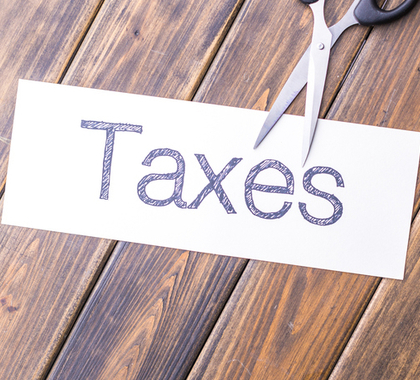Many economists consider levies on income the most destructive form of taxation, because they stifle economic production, innovation, and risk-taking – the main drivers of economic growth. Thankfully, a new tax plan, sponsored by Missouri Rep. Elijah Haahr (R-Springfield), would reduce the rate for Missouri’s top personal income tax bracket, from 5.9 percent to 5 percent, as well as the corporate income tax rate, which would also drop to 5 percent, down from 6.25 percent.
The legislation would also eliminate two of Missouri’s 10 income tax brackets and adjust the brackets annually based on inflation. Further, the proposal would increase the state’s vehicle user fee by indexing the fee to inflation.
Additionally, under Haahr’s plan, Missouri would join the Streamlined Sales Tax agreement, raise fees, end certain itemized deductions, phase out the federal income tax deduction for taxpayers with more than $150,000 in income, and end the $535 senior circuit breaker tax credit for renters. Haahr argues these measures are appropriate because the tax is intended to offset property taxes. The state’s sales and use tax allowances would also be eliminated. (Currently, a vendor is allowed to retain 2 percent of the amount of sales or use tax dollars due to the state if the vendor pays in a timely manner.)
The income tax cuts in Haahr’s plan would encourage economic development by attracting new businesses and investors to Missouri. Conversely, maintaining high income and business taxes would have the opposite effect. According to the Americans for Tax Reform Foundation, data show “each positive 1 percentage point tax burden differential between states decreases the ratio of income migration into the high-tax state by 6.78 percent in a given year.”
However, indexing taxes and fees, which sounds fair and efficient, would not be effective. Under such a scheme, politicians and regulators escape accountability because indexing automatically increases taxes and fees. If Missouri lawmakers want to raise the vehicle tax, they should be required to vote to increase it, and thus be held responsible for the higher rate. Further, these policies can be especially detrimental when inflation outpaces wage growth.
The main problem with transportation funding in the United States is improper spending, not a lack of revenue. Far too many dollars are spent on projects unrelated to roads, such as bike paths and museums. When gas taxes are created with the intention of using those funds as a user fee, gas tax dollars should be spent solely on roads. In The Wealth of Nations, Adam Smith argues correctly that when decentralized user fees fund infrastructure, spending and new construction occurs only when market demand justifies it.
Cutting the personal and corporate income tax would improve Missouri’s economic competitiveness, leaving more money in the pockets of the state’s citizens and businesses to spend, save, and invest. However, lawmakers should avoid tying tax or fee increases to inflation whenever possible, because doing so reduces accountability and could create additional problems for working families in tough economic times.
The following articles examine state income tax reform from multiple perspectives.
Ten Principles of State Fiscal Policy
http://heartland.org/policy-documents/ten-principles-state-fiscal-policy
The Heartland Institute provides policymakers and civic and business leaders a highly condensed, easy-to-read guide to state fiscal policy principles. The principles range from “Above all else: Keep taxes low” to “Protect state employees from politics.”
Rich States, Poor States
http://www.richstatespoorstates.org/publication/rich-states-poor-states-10th-edition/
The 10th edition of this publication from the American Legislative Exchange Council and authors Arthur Laffer, Stephen Moore, and Jonathan Williams offers both individual-state and comparative accounts of the negative effects of high income taxes.
Economic and Revenue Effects of Changes in the Income Tax Rate
https://taxfoundation.org/economic-and-revenue-effects-changes-income-tax-rate/
Erik Cederwall of the Tax Foundation examines the effects of income tax changes on economic outputs and tax revenue. He finds that changes to a state’s top tax bracket create more significant economic impacts than cuts to the lowest bracket.
State Budget Reform Toolkit
https://heartland.org/publications-resources/publications/state-budget-reform-toolkit?source=policybot
The American Legislative Exchange Council outlines a set of budget and procurement best practices to guide state policymakers as they work to solve the budget shortfalls. The toolkit will assist legislators in prioritizing and more efficiently delivering core government services by advancing free markets, limiting government, and promoting federalism and individual liberty.
The Historical Lessons of Lower Tax Rates
http://www.heritage.org/research/reports/2003/08/the-historical-lessons-of-lower-tax-rates
Examining the historical results of income tax cuts, Daniel Mitchell of the Heritage Foundation finds a distinct pattern throughout American history: When tax rates are reduced, the economy’s growth rate improves and living standards increase.
Policy Tip Sheet: Corporate Income Taxes
http://heartland.org/policy-documents/policy-tip-sheet-corporate-income-taxes
Taylor Smith examines corporate income taxes and their effects on economic development. Smith suggests how legislators can limit or eliminate their corporate taxes.
Balancing State Budgets the Smart Way
http://taxfoundation.org/article/balancing-state-budgets-smart-way
Joseph Henchman of the Tax Foundation examines an array of options states can use to remedy both short-term and long-term fiscal woes and put their budgets back on sounder legal footing.
Personalizing the Corporate Income Tax
http://heartland.org/policy-documents/personalizing-corporate-income-tax
Gerald Prante and Scott Hodge discuss in this Fiscal Fact article the effect of corporate income taxes on individual households. “Examining income groups, Chamberlain and Prante found that low-income households pay more in corporate income taxes than they pay in personal income taxes. Geographically, households in largely urban congressional districts and metropolitan areas bear a disproportionate share of corporate income taxes today and, thus, would receive a significant boost in living standards if the corporate tax burden were reduced,” they write.
Fuel Taxes, Tolls Pay for Only One-Third of Road Spending
https://heartland.org/news-opinion/news/fuel-taxes-tolls-pay-for-only-one-third-of-road-spending?source=policybot
Joseph Henchman of the Tax Foundation finds highway user taxes and fees made up just 32 percent of state and local spending on roads. Financing for the rest of the projects came out of general revenues, including federal aid.
Raising Gas Taxes Won’t Fix Our Bridges
https://heartland.org/publications-resources/publications/raising-gas-taxes–wont-fix-our-bridges?source=policybot
In the aftermath of the I-35 bridge collapse in Minneapolis, Minnesota, Adrian Moore of the Reason Foundation argues increasing fuel taxes should not be the only response to state transportation funding problems. Moore wrote, “First we must examine how we spend transportation dollars now. Then we maximize the value out of those dollars. Finally, the last step is to address the need for additional revenue.”
The Impact of Tax Cuts on Economic Growth: Evidence from the Canadian Provinces
https://ntanet.org/NTJ/65/3/ntj-v65n03p563-94-impact-tax-cuts-economic.pdf
In this paper from the National Tax Journal, Ergete Ferede and Bev Dahlby examine the impact of the Canadian provincial governments’ tax rates on economic growth using panel data covering the period 1977–2006. They find that a higher provincial statutory corporate income tax rate is associated with lower private investment and slower economic growth.
Nothing in this Research & Commentary is intended to influence the passage of legislation, and it does not necessarily represent the views of The Heartland Institute. For further information on this and other topics, visit the Budget & Tax News website, The Heartland Institute’s website, and PolicyBot, Heartland’s free online research database.
The Heartland Institute can send an expert to your state to testify or brief your caucus; host an event in your state, or send you further information on a topic. Please don’t hesitate to contact us if we can be of assistance! If you have any questions or comments, contact Lindsey Stroud, Heartland’s government relations manager, at [email protected] or 757/354-8170.




